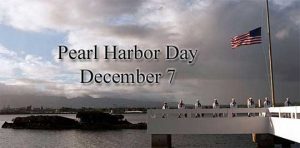St. Tammany Parish Library Remembers National Pearl Harbor Remembrance Day

Today marks the 77th anniversary of the Japanese attack on Pearl Harbor.
Prior to the World Trade Center attack on September 11, 2001, Pearl Harbor was the biggest attack on American soil since the War of 1812. At the time, American had been enjoying a peaceful, if tense, relationship with the Japanese Empire. In the late 1930's and early 1940's, Japan expanded its territory, extending its empire into Korea and China, as well as many islands in the Eastern Pacific. Though an ally of Adolf Hitler's Germany, Japan had yet to overtly attack or harass American forces or claim American territory, and despite plans for eventually invading and claiming the Philippines and other islands, diplomatic meetings continued to take place, even up to the day of the attack.
The primary objective of the attack was to deal a crippling blow against the United States navy, particularly its battleships, and prevent immediate responses to the planned attacks on the Philippines and other objectives. Though having achieved a strong tactical victory, the unwarranted attack, with no formal declaration of war, Admiral Hara Tadaichi reflected "we won a great victory at Pearl Harbor, and thereby lost the war." Another famous quote by Admiral Yamamoto suggested that attacking the United States amounted to attacking a sleeping giant, peaceful at the moment, but mighty when disturbed. Any sentiment of neutrality that existed in the United States evaporated after the attack.
In the aftermath of the attack, the United States lost most of its battleships, many fighter-craft, and over 2000 personnel. The setback forced the United States to rely on aircraft carriers and submarines to conduct offensives against Japan.
On December 8, President Franklin D. Roosevelt appeared before a joint-session of Congress and gave an impassioned speech, requesting a declaration of war, which Congress approved within the hour. Germany and Italy declared war on the United States as well and were themselves declared upon, beginning America's formal entry into the Second World War.
FDR's "Day of Infamy" Speech Full Text
Click the provided link to learn more about the background of the "Day of Infamy" Speech.
Want to learn more about the Attack on Pearl Harbor? Feel free to peruse one of these items from our collection:
I Survived the Bombing of Pearl Harbor, 1941
Although the significance of the attack on Pearl Harbor had been observed to varying degrees since 1941, it was not until 1994 that Congress officially designated December 7 as National Pearl Harbor Remembrance Day. Those wishing to observe should lower their American flag to half-mast until sunset. National Pearl Harbor Remembrance Day is not considered a federal holiday, and no government offices, businesses or schools are required to close.


Add a comment to: National Pearl Harbor Remembrance Day